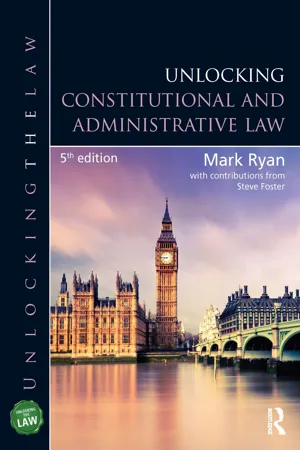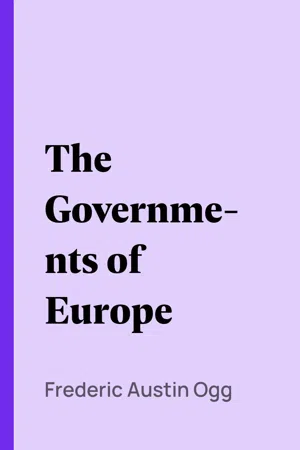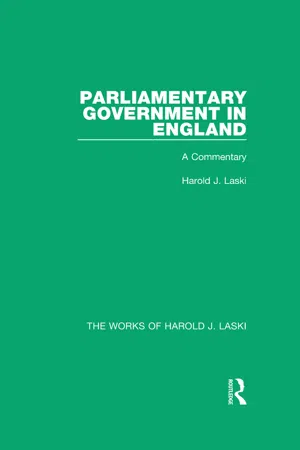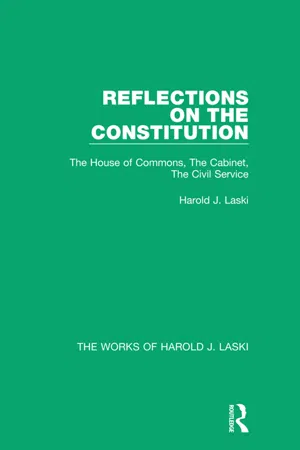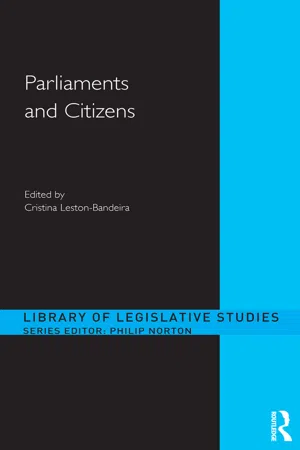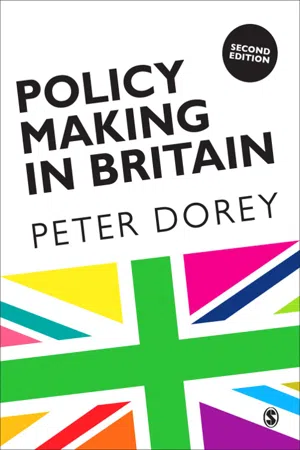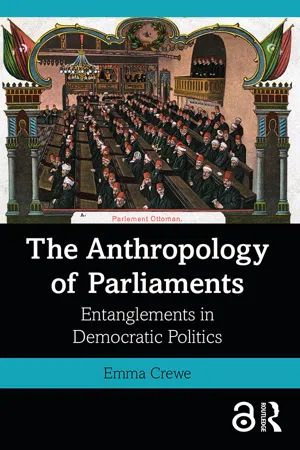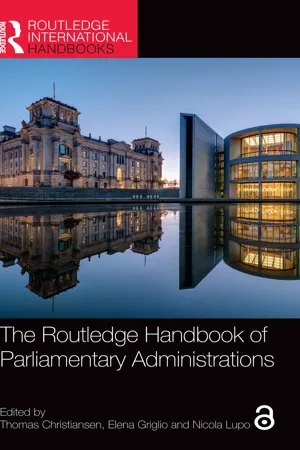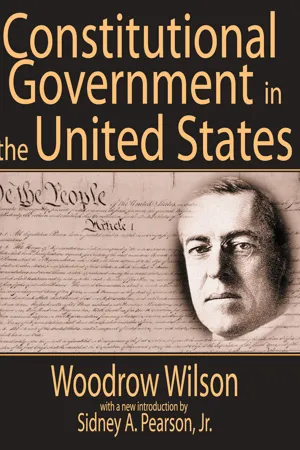Politics & International Relations
House of Commons
The House of Commons is the lower chamber of the UK Parliament, responsible for making and passing laws. Its members, known as Members of Parliament (MPs), are elected by the public in general elections. The House of Commons plays a crucial role in scrutinizing the government, debating important issues, and representing the interests of the public.
Written by Perlego with AI-assistance
Related key terms
Related key terms
1 of 4
Related key terms
1 of 3
10 Key excerpts on "House of Commons"
- eBook - ePub
- Mark Ryan, Steve Foster(Authors)
- 2023(Publication Date)
- Routledge(Publisher)
The role of the House of Commons is somewhat contradictory as it should constitutionally sustain the government (while the government has the support and confidence of the lower House), thereby allowing it to govern and carry on the business of government. At the same time, however, the House must simultaneously scrutinise the actions and policy of the government and withdraw support from it if it loses confidence in it (in other words, if the government has lost the confidence of the people). On rare occasions, such as in 1979, the government has lost a vote of no confidence in it, thereby symbolically losing the support of the people as represented in the House of Commons (see section 12.2.1). To legitimise government actions The actions of government are legitimised by the House of Commons if they pass scrutiny by MPs. This could be in the form of a particular government policy or in a Bill drafted by the government. In this context it is important to bear in mind the political composition of the House of Commons, which is dictated by the nature of the electoral system (see section 9.5). A judicial function The House of Commons also performs, in effect, a judicial function when it enforces parliamentary privilege (see section 8.7.3). In addition, according to Bagehot, the teaching function of the House of Commons involved it teaching ‘the nation what it does not know’ (arguably this could occur, for example, in the context of a debate) - eBook - ePub
- Frederic Austin Ogg(Author)
- 2007(Publication Date)
- Perlego(Publisher)
80. Present Ascendancy.—Legally, as has been explained, Parliament consists of the king, the lords spiritual, the lords temporal, and the commons. For practical purposes, however, it is the House of Commons alone. "When," as Spencer Walpole wrote a quarter of a century ago, "a minister consults Parliament he consults the House of Commons; when the Queen dissolves Parliament she dissolves the House of Commons. A new Parliament is simply a new House of Commons."[106] The gathering of the "representatives of the commons" at Westminster is, and has long been, without question the most important agency of government in the kingdom. The House of Commons consists at the present day of 670 members, of whom 465 sit for English constituencies, 30 for Welsh, 72 for Scottish, and 103 for Irish. Nine of the members are chosen, under somewhat special conditions, by the universities, but the remaining 661 are elected in county or borough constituencies under franchise arrangements, which, while based upon residence and property qualifications, fall not far short of manhood suffrage. The chamber is at the same time the preponderating repository of power in the national government and the prime organ of the popular will. It is in consequence of its prolonged and arduous development that Great Britain has attained democracy in national government; and the influence of English democracy as actualized in the House of Commons upon the political ideas and the governmental agencies of the outlying world, both English-speaking and non-English-speaking, is simply incalculable.81. Undemocratic Character at the Opening of the Nineteenth Century. - eBook - ePub
- Harold J. Laski(Author)
- 2014(Publication Date)
- Routledge(Publisher)
It is, moreover, a relation into which all the elements of the population now enter; no one could now truthfully say, what Bagehot was able to say, that the “common order of work-people” are a section which need not be taken into account in estimating the influences which determine public opinion. Universal suffrage has meant that there is no stratum in the population whose view may be regarded by political parties as insignificant. To produce from the great welter of interests that thereby have influence a policy which is adequate to the maintenance of efficient government is, of course, a very difficult task. That it has so far been successfully performed is very largely due to the place the House of Commons holds in the esteem of the nation.What is the House of Commons for? Until we are clear about its purposes, we cannot really understand its significance. After all, to give supreme legislative power to a miscellaneous body of 615 men and women, mostly amateurs in politics, would not produce a successful legislative assembly. The secret lies in the way in which the House of Commons is organized and the ends for which that organization is applied. Above all, it is important to realize that the House of Commons is not an exact mirror of the interests and opinions of the nation. If it were, it could not possibly perform its work. For those opinions and interests are so various in their formidable complexity that any House which sought to find any effective place for a considerable number of them would be too atomic in character to be capable of coherent policy. The life of the House of Commons depends upon its representation only of such predominant strands of general public opinion as will, normally, enable a Government to be formed behind which there is an effective majority. Thereby that Government is able to inject a stream of continuous tendency into affairs. The business of making a Government and providing it, or refusing to provide it, with the formal authority for carrying on the public business is the pivotal function of the House of Commons upon which all other functions turn.It means, of course, that the life of the House of Commons is necessarily lived in terms of the party system. Parties are the basis upon which the organization of the House for coherency is made possible; and the member of the House of Commons must, with very few exceptions, be a good party man if it is to do its work adequately. The philosopher in his study may repine at this necessity. He may insist that this involves the sacrifice of individual conscience to party allegiance. He may argue that it leads members blindly into the division-lobbies on matters about which they have not even heard the debate in the chamber. He may write angrily, for reasons I shall discuss later, about Cabinet dictation in the House. The facts are quite different from these closet abstractions. The number of times when an average member feels inclined to vote against his party, especially when it is in office, is pretty small; and the evidence seems to show that when the impulse so to vote is an urgent one, he obeys it. It is foolish to imagine that, in matters of debate, a member must make up his mind upon each separate item the House decides. The House is a body for getting business done; the member’s task is to be aware of large tendencies and to be on hand to support those the general direction of which he broadly approves. If he has so nice a conscience that a scrupulous examination of mostly technical minutiae is the necessary preamble to his vote, the proper comment upon his attitude is that he is not by temperament suited to be a member of a legislative assembly. - eBook - ePub
- Philip Norton(Author)
- 2017(Publication Date)
- Manchester University Press(Publisher)
1Why the House of Lords mattersThe United Kingdom has a parliamentary system of government. Government is not elected directly (as in a presidential system), but is chosen through parliamentary elections. A party achieving an absolute majority of seats in the House of Commons is invited to form the government. Political parties seeking to implement their preferred programme of public policy therefore fight to win seats. The chamber of the House of Commons is the arena in which the second-largest party forms an official Opposition and in which it, and other parties, question and challenge government. The chamber provides the Opposition with the opportunity to demonstrate that it is the alternative government, ready to replace the party opposite at the next election. The exchanges between the Prime Minister and the Leader of the Opposition at the weekly Prime Minister's Question Time act as a magnet for the television cameras.Given the centrality of the House of Commons to political life in the United Kingdom, it is not unusual to see Parliament and the House of Commons treated as synonymous terms. Commentators will variously say ‘Parliament today is debating …’ when they mean ‘The House of Commons today is debating …’. The focus on the House of Commons is not surprising, but masks the fact that the United Kingdom has a bicameral, that is a two-chamber, legislature. The House of Lords is the second chamber of Parliament.As a second chamber, the House of Lords is distinctive for three reasons. The first is the very fact of its existence as a second chamber. Most nations – almost two-thirds – have unicameral, that is single-chamber, legislatures (Massicotte 2001 ). Bicameral legislatures tend to be a feature of federal nations. However, they are also to be found in some unitary, often large nations, such as France, Italy, and the UK. The House of Lords’ second distinctive feature is to be found in its origins and its longevity. As with the House of Commons, there was no specific date on which we can say it came into existence. It has evolved and, as we shall see (Chapter 2 ), has done so over several centuries. The third distinctive feature is that the members of the House are not elected. In this, the House is not unique. Several nations, including Canada, have appointed second chambers (see Russell 2000 - eBook - ePub
Reflections on the Constitution (Works of Harold J. Laski)
The House of Commons, The Cabinet, The Civil Service
- Harold J. Laski(Author)
- 2014(Publication Date)
- Routledge(Publisher)
In all these aspects, I see no reason to suppose that the status of the House of Commons has deteriorated in the last fifty years. In none of them should I be prepared to admit the need of special remedies to meet a declining situation. It is the House which makes and unmakes Ministerial reputations. It is the House that watches with minute care the need for administration to be both just and reasonable. A Minister who persists in a policy against which the clear voice of the House has warned him will find, as a general rule, that his own Party will criticise him as bitterly as the Opposition. The House knows almost by intuition those well-known types, the careerist, the man who talks merely for the sake of hearing his own voice, the man with a special hobby who brings it up as Mr. Dick brought up King Charles’ head, and the crashing bore whose election to membership is a surprise, but whose re-election is something like a miracle. I think it is normally true that the House rises to the great occasion; and despite most complaints that every Opposition will make, it is usually true that from the passage of the second reading of a Bill to the stage where it is sent on to the House of Lords, most things that need to be said both for and against it will in the course of debate be said. In general—Mr. Attlee is a notable exception—most members from the two front benches tend to speak too long, less, I suspect, because of what they have to say than because they think it disrespectful both to the House and to their own positions, to occupy less than about forty minutes and upwards. It is of course, true that there is a good deal of repetition in the run of speeches in any debate; but this is true of all debating assemblies, and could only be avoided by confining discussion to one speech on either side. I should agree that, in many subjects, the speeches of members, and even of Ministers, reveal that they are not expert about them; but members of the House of Commons are not elected because they are expert and one of the most notable things in Parliamentary history is how rarely we find a really distinguished specialist successful in the kind of discussion for which the House of Commons is intended. After all, it is not a meeting of experts like, say, a gathering of members of the Chemical Society who have come to hear a paper on some aspect of chemical research, or of those members of the London Mathematical Society interested in the theory of numbers who have met in great excitement to hear someone of the calibre of the late Professor A. H. Hardy, or of the eminent Indian mathematician, Ramanujan, describe a new approach to the solution of Fermat’s theorem. They are essentially a group of representative men and women, mostly not inherently notable in themselves, but clothed with a representative capacity by the constituencies which have sent them to the House of Commons. With a small number of exceptions, they are not returned to Parliament for exceptional beauty of character, or distinction of mind; they have been returned there to support a party which their supporters hope will win enough seats to be able to form a government under the Premiership of its leader. The more fully we bear this in mind, the more clearly, I suggest, we shall understand what is the essential nature of the House of Commons.Passage contains an image
4 A REPLY TO MAJOR CRITICISMS OF PARLIAMENT
DOI: 10.4324/9781315742533-4Anyone who reads even a small part of the recent literature on Parliament will find in it, in addition to the criticisms I have already dealt with, certain others upon which special emphasis is laid. The House of Commons, we are told, has lost its vital position as the watch-dog of the nation’s expenditure; it can now hope only to sound its warnings when some indefensible wastage has already taken place. Since the publication, in 1929, of the late Lord Hewart’s notorious pamphlet which he called The New Despotism - eBook - ePub
- Cristina Leston-Bandeira(Author)
- 2016(Publication Date)
- Routledge(Publisher)
Parliament and Citizens in the United Kingdom PHILIP NORTONThe relationship that has developed between Parliament and citizen in the United Kingdom has been two-way and multi-faceted. This article examines the input achieved by citizen (as voter, constituent, and member of organised interest) through party, the MP, and the institution: and the output of Parliament to citizen through party, MP, and its own resources. The nature of and need for engagement have been exacerbated by recent scandals and both Houses of Parliament have sought to achieve greater direct engagement with the public through the use of the new social media. Citizens continue to distinguish between the local MP and the institution of which the MP is a member.The British House of Commons, declared Enoch Powell, 'is a place where government speaks to the people and the people, through their representatives, speak to government' (Powell 1982, p. 169). This observation encapsulates a varied and dynamic relationship. It is a relationship that has developed over centuries and become far more complex since the advent of a mass franchise. It is a relationship that is at the heart of the British political system.Development of the Link
Fundamental to the relationship between Parliament and citizen in the United Kingdom is a territorial base. The origins of the House of Commons are to be found in England in the summoning to the king's court in the thirteenth century of some knights from the shires (the counties) and then burgesses from the boroughs (leading figures from the towns). They joined the existing lords and churchmen who formed the court and were summoned in order to give their approval to the king's demands for additional taxation. The knights and burgesses eventually came to deliberate separately from the lords and churchmen, thus forming respectively the House of Commons and the House of Lords. - eBook - ePub
Policy Making in Britain
An Introduction
- Peter Dorey(Author)
- 2014(Publication Date)
- SAGE Publications Ltd(Publisher)
However, it should not be assumed that the relationship between the House of Commons and House of Lords is normally an adversarial one. The vast majority of legislation emanating from the House of Commons is endorsed by the House of Lords, and on those occasions when the Second Chamber does initially inflict a defeat on the government, perhaps over a specific clause in a Bill, a compromise is usually reached, either by virtue of the House of Lords conceding (i.e., abandoning its opposition) if ministers insist on pursuing it, or because ministers agree to remove, rewrite or otherwise amend it to the satisfaction of the Second Chamber.In other words, although clashes and stand-offs between the two Houses make good headlines and stories for journalists, the normal relationship is more prosaic, usually entailing a close and constructive partnership over the conduct of parliamentary business. The routine work of the House of Lords is remarkably similar to that of the House of Commons, and in this respect, the Second Chamber generally complements the business of the Commons. Indeed, in many respects, the House of Lords alleviates some of the pressure on the House of Commons; if a Second Chamber did not exist, then (quite apart from a diminution of parliamentary checks and balances) either MPs would become completely overwhelmed and/or a second chamber of some kind would have to be invented de novo.It is to the roles and functions that the House of Commons and House of Lords play in the policy process that we now turn our attention.LEGISLATIONAs Parliament is a legislature, detailed consideration of proposed laws (Bills) is naturally a major function both of the House of Commons and the House of Lords. There are three types of Bill variously considered by Parliament (especially the House of Commons), namely Public Bills, Private Bills and Private Members’ Bills, each of which will be briefly discussed. - eBook - ePub
The Anthropology of Parliaments
Entanglements in Democratic Politics
- Emma Crewe(Author)
- 2021(Publication Date)
- Routledge(Publisher)
House of Lords: Party and Group Strengths and Voting, LLN 2012/026 , 27 June 2012.8 https://www.parliament.uk/business/lords/whos-in-the-house-of-lords/house-of-lords-expenses/ , accessed 13 October 2020.9 Earl Russell, HL Debates, 13 October 1998, col. 1324.10 Interview with Emma Crewe, spring 2000.11 To be more precise members are elected within parties and then approved by the Committee of Selection and then the House itself whereas Chairs are elected by the whole House.12 Madeleine Westerhout, Personal Secretary to Trump, in ‘Settling into the White House’, The Trump Show episode 1, 12 October 2020, BBC, https://www.bbc.co.uk/programmes/p08v2sq0 , accessed 14 November 2020.Passage contains an image
3
Representing
DOI: 10.4324/9781003084488-3This is a wonderful place, filled overwhelmingly by people who are motivated by their notion of the national interest, by their perception of the public good and by their duty – not as delegates, but as representatives – to do what they believe is right for our country.(John Bercow speaking in the UK House of Commons, 9 September 2019)1What is political representation?
When the Speaker of the UK House of Commons announced his resignation in 2019 he referred to MPs as representatives and not delegates of the public – elected representatives who should use their own judgement in deciding what is best for the country. He was referring to what has become a sacred text for the trustee approach to representation, the words of former English MP Edmund Burke:It ought to be the happiness and glory of a representative to live in the strictest union, the closest correspondence, and the most unreserved communication with his constituents. Their wishes ought to have great weight with him; their opinion, high respect; their business, unremitting attention. It is his duty to sacrifice his repose, his pleasures, his satisfactions, to theirs; and above all, ever, and in all cases, to prefer their interest to his own. - Thomas Christiansen, Elena Griglio, Nicola Lupo, Thomas Christiansen, Elena Griglio, Nicola Lupo, Thomas Christiansen, Elena Griglio, Nicola Lupo(Authors)
- 2023(Publication Date)
- Routledge(Publisher)
UNESCO World Heritage Site—and manage the corporate, commercial, administrative and financial services required for a multi-thousand workforce. The Parliamentary Digital Service staff provides Members and their staff with essential IT equipment and support, as well as building and maintaining key digital services and outputs, such as the website and other applications, such as the tool to submit questions to the government electronically; in addition to contributing to the development of the virtual and hybrid chambers during the coronavirus pandemic, alongside the Parliamentary Broadcasting Unit (part of the Chamber and Participation Team). Individual members in each House can also access advice on procedure from clerks, helping to ensure parliamentary questions and proposed amendments to legislation are in order. They can also use the services of the libraries of each House, which produce briefing papers on a vast range of policy areas, as well as on legislation and business scheduled for debate. The libraries also respond to queries directly for members and their staff provide a bespoke and impartial research and information service. The Interparliamentary Relations Office, based within the Commons, and Overseas Office in the Lords, manages relations with other parliaments and the delegations provided to inter-parliamentary assemblies.As noted earlier, both Houses have undergone periodic reviews of their administrative structures, aiming to modernize and professionalize the administration: for example, the external review of the management of the House of Lords in January 2021 which found that the “organisational performance of the House of Lords lags that of many commercial, public sector and voluntary organisations” (House of Lords Commission, 2021 , p 5). The general trend of reviews in the Commons since the 1974 Compton Review has been to unify the administration, moving away from a federal system of departments. These reviews have also considered the “bureaucratic” leadership of the institution. The House of Commons Service is led by the Clerk of the House, and the House of Lords Administration by the Clerk of the Parliaments. In addition to their roles as the chief procedural adviser to each House, the occupants of these posts also serve as the Accounting Officer and Corporate Officer for their House, under the Parliamentary Corporate Bodies Act 1992. The wide-ranging responsibilities of the Clerks’ roles have led to questioning over whether any single occupant of each post can offer both procedural and management expertise. In 2014, this issue caused the recruitment of the Clerk of the House to be paused and then terminated, due to the concerns of MPs that the selected candidate, the Director of Parliamentary Services in the Australian Parliament, did not have the necessary procedural expertise (Meakin and Geddes, 2022 ). A select committee was established to consider the future of the post and recommended the establishment of a Director General post, with “responsibility for resource allocation and delivery across the House service”, working as a leadership team with the Clerk (House of Commons Governance Committee, 2014 , p60). The External Management Review of the Lords, mentioned above, recommended the creation of a Chief Operating Officer post, to “focus on the work outside the Chamber and Committees i.e., the management of the House as against the business of the House” (House of Lords Commission, 2021- eBook - ePub
- Woodrow Wilson(Author)
- 2017(Publication Date)
- Routledge(Publisher)
It is the reaction of the several parts of government upon one another that gives each part its final form and character. It is useless to study any living structure of government anatomically, in its separate parts. Its character and significance come to light, as I have already several times insisted, only when we study it as an organic whole, living and acting from day to day. Our present study must at every stage be a study of the synthesis of power in the government on the one hand, and of the people's control of the government on the other; for there can be no power which is not synthetic, which does not operate with organic unity; and there can be no constitutional government where the organs of government are not constantly under the control of public opinion. We shall get our completest understanding of the House of Representatives, therefore, if we look at it from two points of view: from the point of view of its synthesis with the other parts of the Government, and from the point of view of its relations to opinion.If you were to ask an Englishman to describe the government of England, he would of course include the Parliament in his description. Indeed, it is likely that he would have more to say of the House of Commons than of anything else. But if you were to speak to him of 'The Government,' he would not think of the House of Commons but only of the ministers, of what we should call the administration, I can make the part played by the House of Representatives in our system clearest by contrasting it with the English House of Commons, and in order to make that contrast carry its full significance it is necessary that we should bear these two meanings of the word government in mind and never confuse them. When I said in a previous lecture that it was not necessary for the full realization of constitutional government that representative assemblies should become a part of the Government,' I meant, of course, a part of the administrative organ of government, the organ that is looked to for initiative, which makes choice of policy and actually controls the life of the nation under the laws; and the significant difference between English and American political development is that in America Congress has become part of the Government, while in England Parliament has not. Parliament is still, as it was originally intended to be, the grand assize, or session, of the nation, to criticize and control the Government. It is not a council to administer it. It does not originate its own bills, except in minor matters which seem to spring out of public opinion or out of the special circumstances of particular interests, rather than out of the conduct of government. Every legislative proposition of capital importance comes to it from the ministers. The duties of the ministers are not merely executive: the ministers are the Government. They look to Parliament, not for commands what to do, but for support in their own programs, whether of legal change or of political policy.
Index pages curate the most relevant extracts from our library of academic textbooks. They’ve been created using an in-house natural language model (NLM), each adding context and meaning to key research topics.
Explore more topic indexes
Explore more topic indexes
1 of 6
Explore more topic indexes
1 of 4
